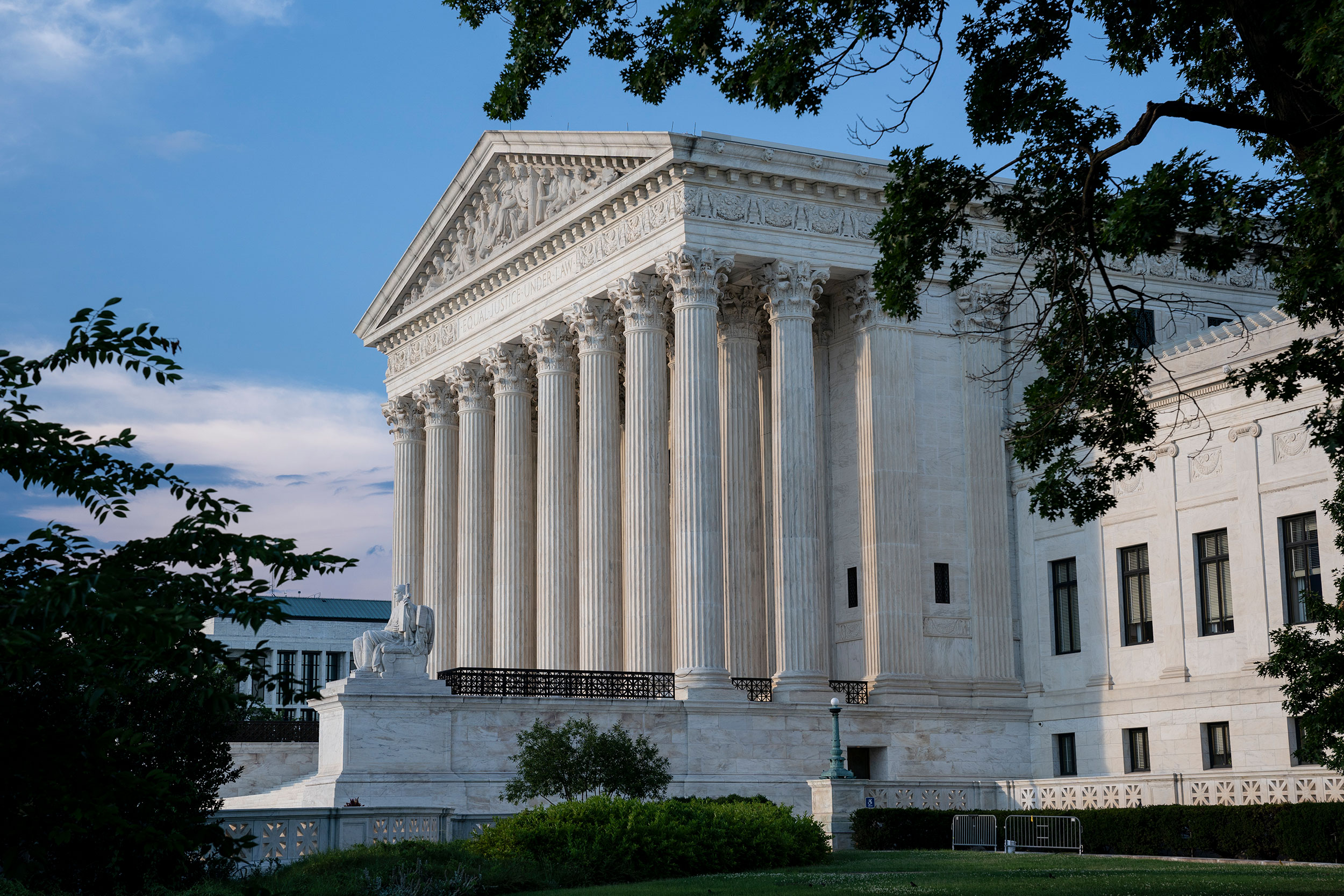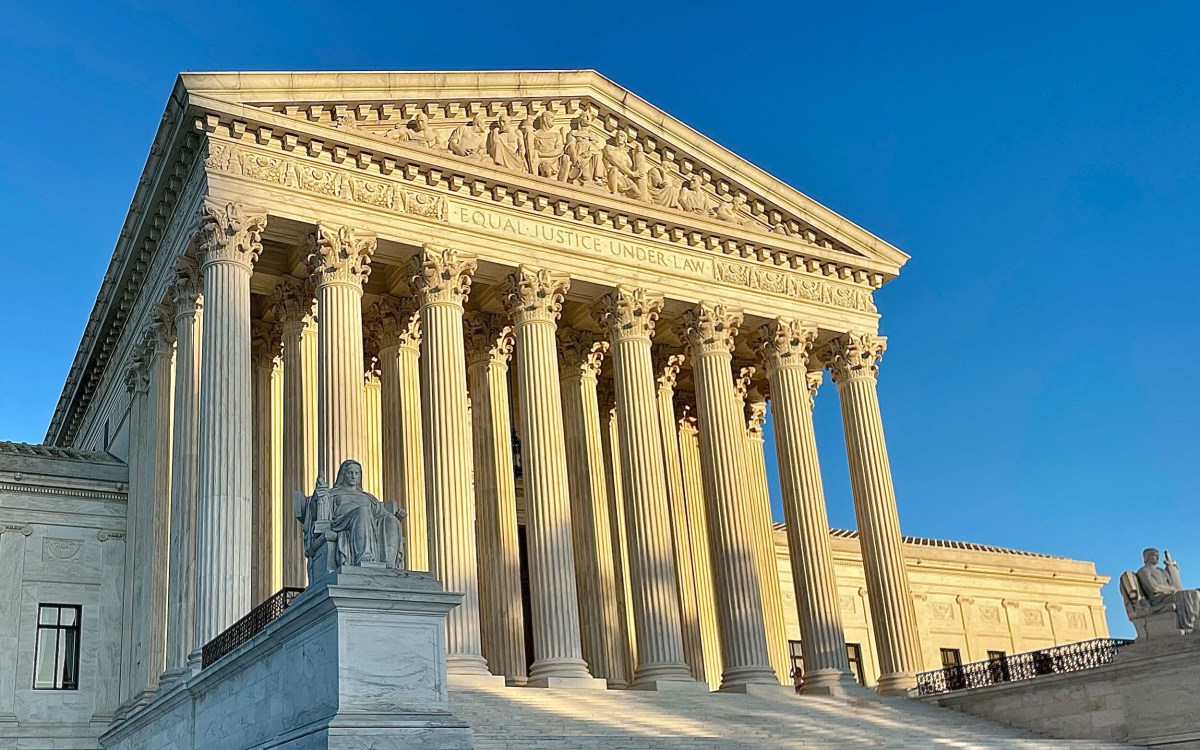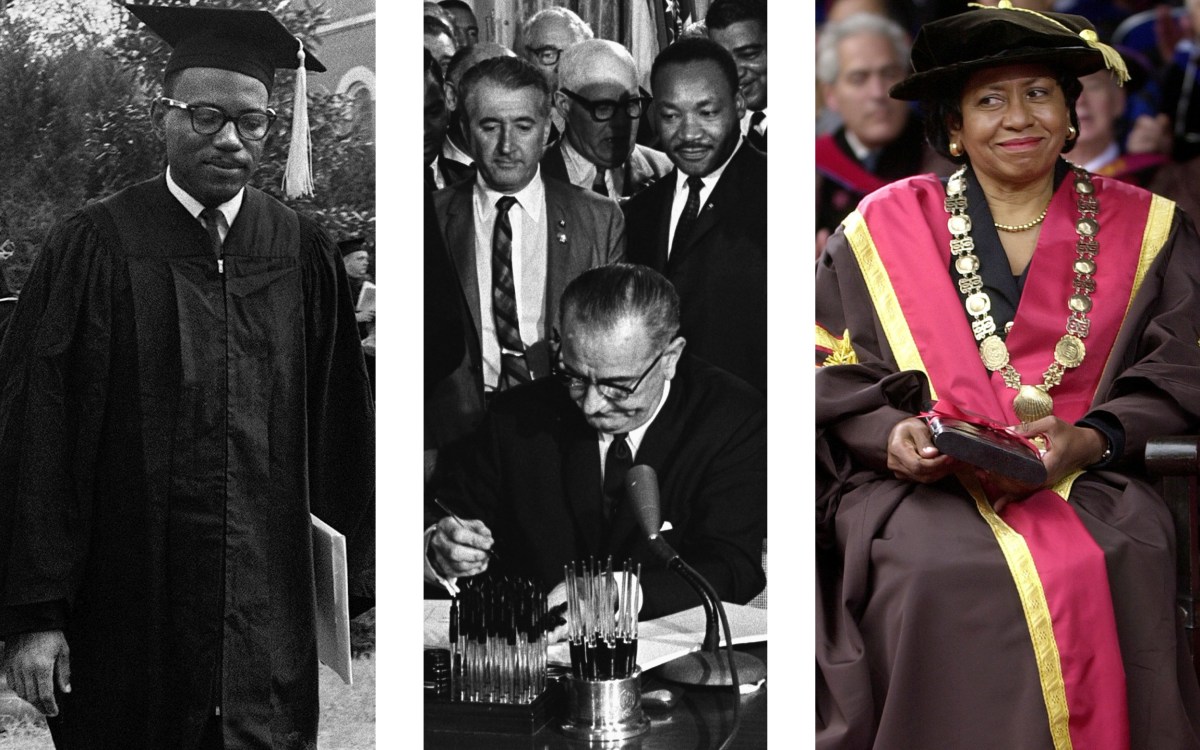Harvard united in resolve in face of Supreme Court’s admissions ruling

J. Scott Applewhite/AP Photo
University ‘remains steadfast’ in commitment to campus that reflects wide range of backgrounds and experiences
In a decision upending more than four decades of precedent, the Supreme Court on Thursday struck down race-conscious admissions programs at Harvard and the University of North Carolina, sparking concerns about far-reaching consequences for institutions of higher education across the nation.
The vote was 6-3 in the UNC case and 6-2 in the Harvard case, because of the recusal of Justice Ketanji Brown Jackson. The decision concludes a nine-year effort by Harvard to defend policies that include race as one factor among many in admissions decisions. The lawsuit was brought by the anti-affirmative action group Students for Fair Admissions, which was created by the conservative activist Edward Blum. Harvard had prevailed in prior decisions by two federal courts that applied existing precedent.
Writing for the majority in Thursday’s ruling, Chief Justice John Roberts said that while Harvard and UNC offered a “commendable” set of goals to justify their admissions programs, these interests are “elusive”and insufficiently measurable to meet the standards previously set forth by the court.
“Because Harvard’s and UNC’s admissions programs lack sufficiently focused and measurable objectives warranting the use of race, unavoidably employ race in a negative manner, involve racial stereotyping, and lack meaningful end points, those admissions programs cannot be reconciled with the guarantees of the Equal Protection Clause,” Roberts wrote in a rejection of Harvard’s core legal arguments and of two federal court decisions in the University’s favor in Students for Fair Admissions Inc. v. President and Fellows of Harvard College.
The court said that the decision does not forbid schools from considering students who discuss in their application how race has affected their life. But it warned admissions officers against using personal essays to get around Thursday’s decision, noting that when a student references an experience overcoming discrimination, for example, any benefit must be tied to that student’s courage and determination, not race alone. “In other words,” the justices wrote, “the student must be treated based on his or her experiences as an individual — not on the basis of race.”
In dissent, Justice Sonia Sotomayor was joined by Justice Elena Kagan and Jackson, who heard the UNC case. The ruling “subverts the constitutional guarantee of equal protection by further entrenching racial inequality in education,” Sotomayor wrote.
Though advances related to race-conscious admissions have been “slow and imperfect,” she said, such programs have made a measurable difference since the Supreme Court first allowed their use in 1978.
“Today, this Court stands in the way and rolls back decades of precedent and momentous progress,” she said.
Even so, Sotomayor was optimistic that the ruling would not derail schools in their pursuit of racial diversity.
“Notwithstanding this Court’s actions, however, society’s progress toward equality cannot be permanently halted. Diversity is now a fundamental American value, housed in our varied and multicultural American community that only continues to grow. The pursuit of racial diversity will go on,” she wrote.
“Although the Court has stripped out almost all uses of race in college admissions, universities can and should continue to use all available tools to meet society’s needs for diversity in education.”
In response to the ruling, leaders from across the University, including President Larry Bacow and President-elect Claudine Gay, released a statement emphasizing “the fundamental principle that deep and transformative teaching, learning, and research depend upon a community comprising people of many backgrounds, perspectives, and lived experiences.”
They continued: “That principle is as true and important today as it was yesterday. So too are the abiding values that have enabled us — and every great educational institution — to pursue the high calling of educating creative thinkers and bold leaders, of deepening human knowledge, and of promoting progress, justice, and human flourishing.”
In a video released early Thursday afternoon, Gay, who takes office July 1, said, “For nearly nine years, Harvard vigorously defended our admissions process and our belief that we all benefit from learning, living, and working alongside people of different backgrounds and experiences.”
While complying with the Court’s decision will necessitate changes to the way the University pursues diversity, Harvard’s commitment to that work “remains steadfast,” she said.
Reaction to the ruling around the nation was swift as political leaders voiced concerns about the repercussions.
In a short White House speech President Biden said he “strongly, strongly disagree[d]” with the ruling, which “threatens to move the country backwards.”
“I believe our colleges are stronger when they are racially diverse. Our nation is stronger because we are tapping into the full range of talent in this nation,” Biden told reporters.
Former President Barack Obama said in a statement, “Affirmative action was never a complete answer in the drive towards a more just society. But for generations of students who had been systematically excluded from most of America’s key institutions — it gave us the chance to show we more than deserved a seat at the table.” With this decision, “it’s time to redouble our efforts.”
Ensuring diversity on campus enhances the education of all, said former first lady Michelle Obama in a statement. “Every student who heard a perspective they might not have encountered, who had an assumption challenged, who had their minds and their hearts opened gained a lot as well,” she said.
Many colleges and universities expressed their disappointment as well as their commitment to the values of diversity on campus.
Noting Brown’s 20-year legal history supporting the use of affirmative action in admissions, University President Christina H. Paxson said in a note to the school’s community that “our values have remained constant. We believe that the student body diversity is essential to achieving our educational mission.”
Ben Chang, a Columbia representative, said in a brief statement on the school’s website that diversity is central to the university’s identity. “It reflects the cultural richness of New York City as well as our mission to foster meaningful interactions and prepare students to make a difference in the world.” He added the university’s commitment to those values is “unwavering.”
President Santa J. Ono and Provost Laurie K. McCauley of the University of Michigan at Ann Arbor said they were “deeply disheartened by the Court’s ruling” in an email Thursday to the community. The decision will have little effect on colleges and universities in Michigan since affirmative action was banned statewide 17 years ago, but the two leaders said they “remain firmly convinced that racial diversity is one of the many important components of a broadly diverse student body and an intellectually and culturally rich campus community.”
In 2013, SFFA filed suit against Harvard in U.S. District Court in Boston claiming that its race-conscious admissions policies were unconstitutional. Following trial, a district court judge upheld Harvard’s limited use of race during admissions in a 2019 ruling, finding the program was lawful and that SFFA had provided no evidence that Asian Americans, or any other racial groups, were targeted or penalized by it.
In 2020, the U.S.Court of Appeals for the First Circuit affirmed the district court’s finding that Harvard’s admissions program did not violate Title VI of the Civil Rights Act. SFFA petitioned the Supreme Court in 2021 to hear the case.






